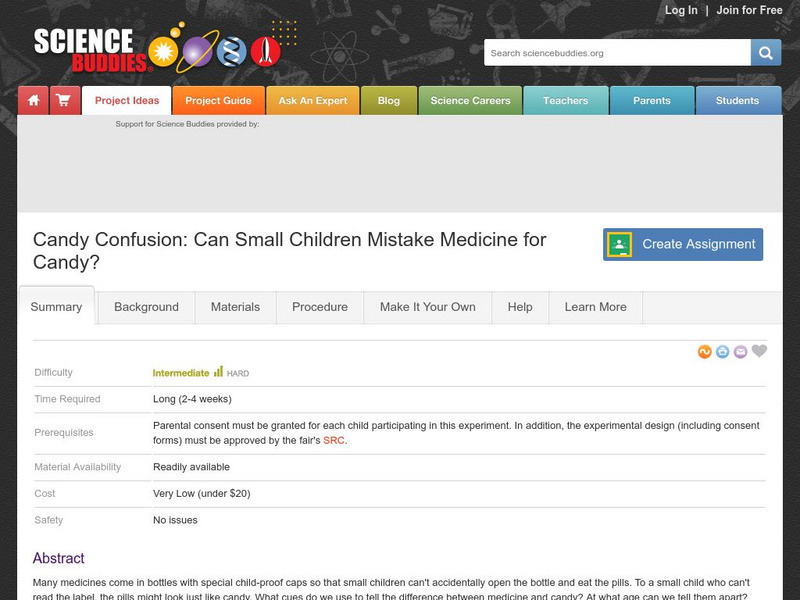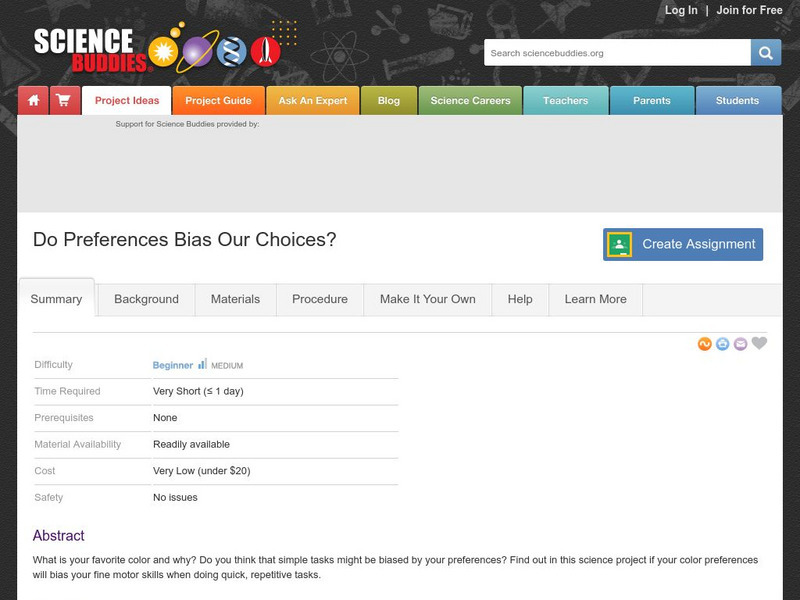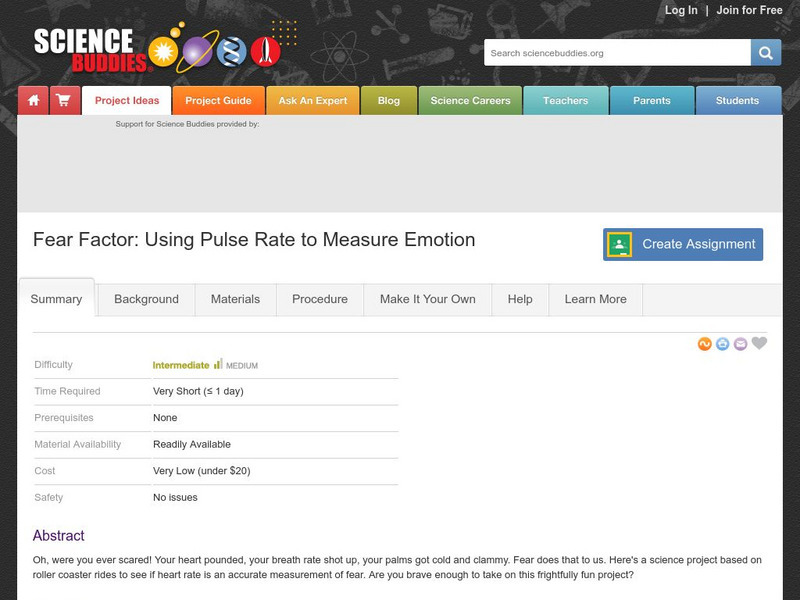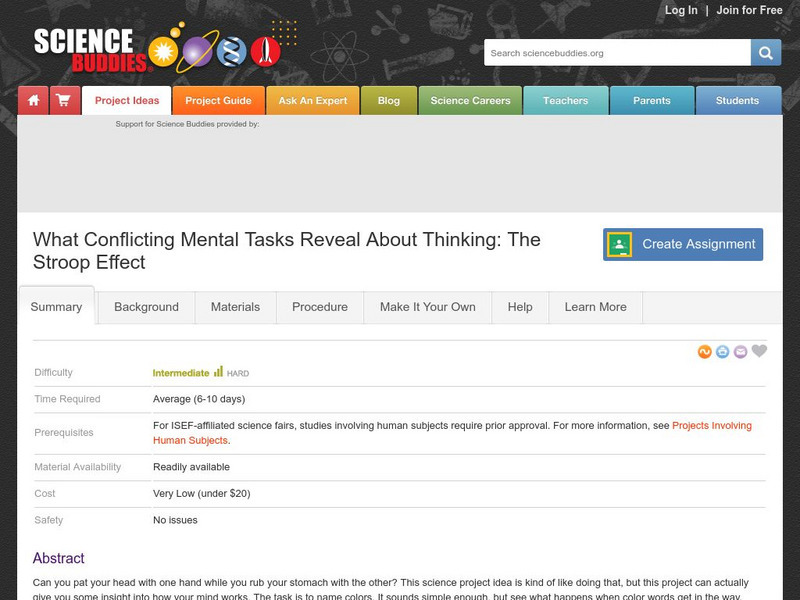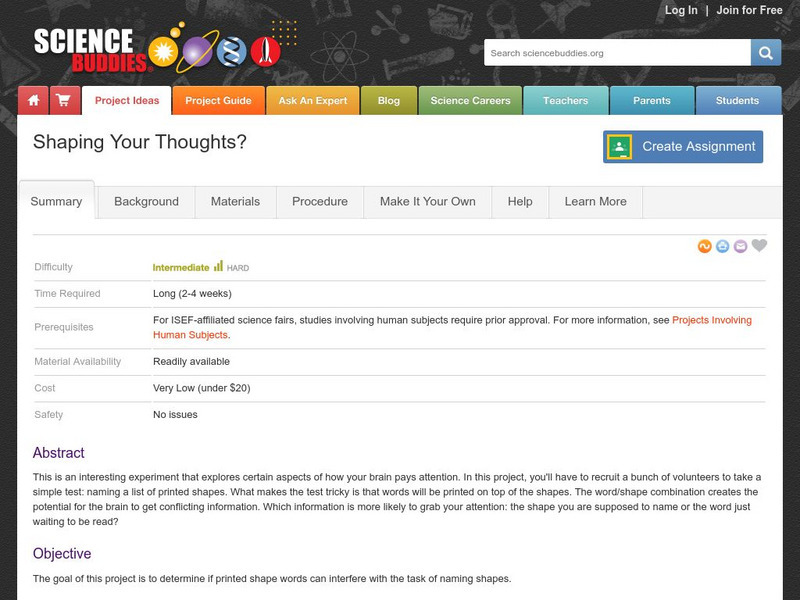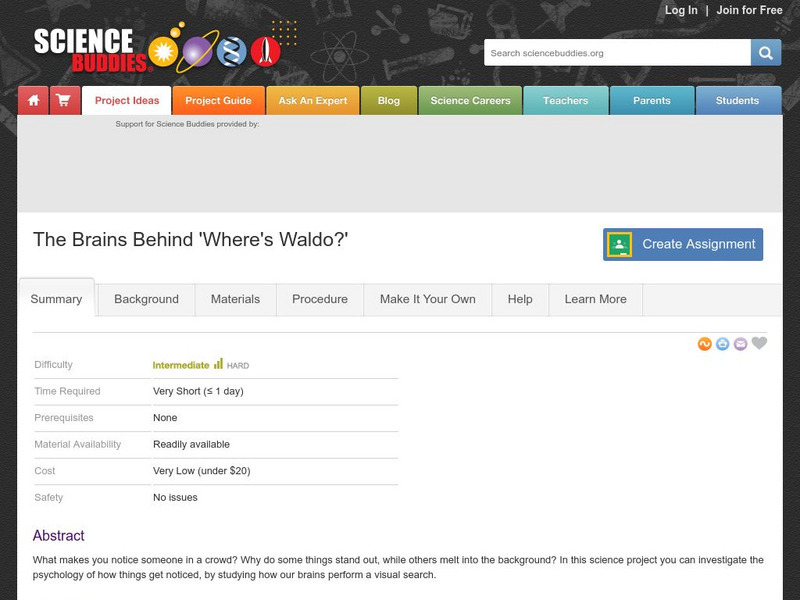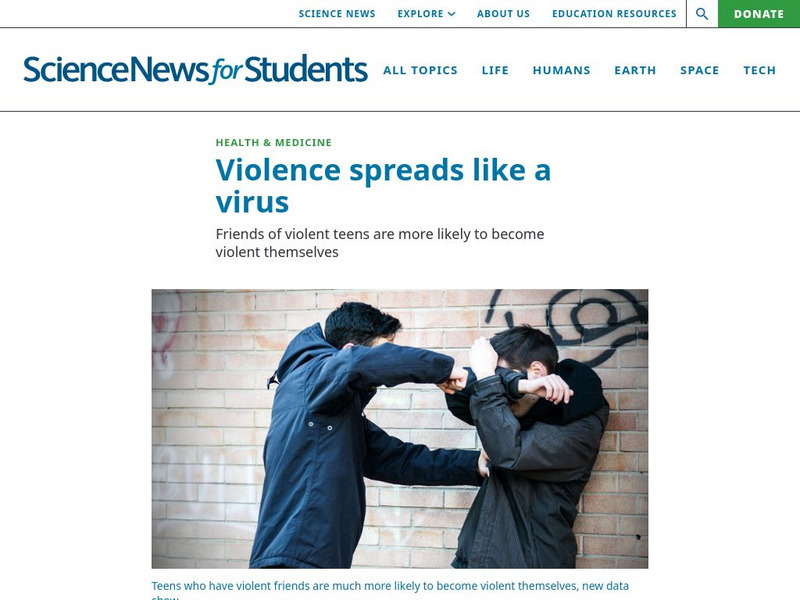Science Buddies
Science Buddies: Candy Confusion: Can Small Children Mistake Medicine for Candy?
Many medicines come in bottles with special child-proof caps so that small children can't accidentally open the bottle and eat the pills. To a small child who can't read the label, the pills might look just like candy. This project helps...
Science Buddies
Science Buddies: Do the Eyes Have It?
Some people have a photographic memory and can memorize anything they see almost instantly. Other people can remember almost anything they hear. Try this experiment to see which type of memory you have.
Science Buddies
Science Buddies: Do Preferences Bias Our Choices?
In this science project you will test whether color preference will affect repetitive tasks that require fine motor coordination, like picking up small objects very quickly. Find out if your color preferences will bias these repetitive...
Science Buddies
Science Buddies: How Many Numbers Can You Remember?
Most people don't even remember phone numbers anymore, and instead program them into their phones. There is a limit to the number of numbers, or digits, that most people can remember. Try this experiment to test your digit span, the...
Science Buddies
Science Buddies: Multitasking: Brain Drain or Boost in Efficiency?
Think it's a good idea to plug into iTunes, surf the Web, or watch TV while doing homework or trying to read? Many people do it and claim that jumping from one activity to another keeps their attention level up and even gives their brain...
Science Buddies
Science Buddies: Fear Factor: Using Pulse Rate to Measure Emotion
Do you remember a situation when you heart pounded, your breath rate shot up, and your palms got cold and clammy? Fear does that to us. Here's a science project based on roller coaster rides to see if heart rate is an accurate...
Science Buddies
Science Buddies: The Bouba Kiki Effect
It may be possible for certain symbolic characteristics, like sharpness and roundedness, to cross language barriers. For this experiment you will investigate the Bouba-Kiki Effect to find out if abstract visual properties can be linked...
Science Buddies
Science Buddies: What Conflicting Mental Tasks Reveal About Thinking
Can you pat your head with one hand while you rub your stomach with the other? This experiment is kind of like that, but it can actually give you some insight into how your mind works. The task is to name colors. It sounds simple enough,...
Science Buddies
Science Buddies: Shaping Your Thoughts?
This is an experiment that explores certain aspects of how your brain pays attention. In this project, you'll have to recruit volunteers to take a simple test: naming a list of printed shapes. What makes the test tricky is that words...
Science Buddies
Science Buddies: Warped Words and the Stroop Effect
The Stroop effect describes an experiment about the time it takes to name the color of printed words. When you try to name the color in which color words are printed, it takes longer when the color word differs from the ink color than...
Science Buddies
Science Buddies: The Brains Behind 'Where's Waldo?'
What makes you notice someone in a crowd? Why do some things stand out, while others melt into the background? In this experiment you can investigate the psychology of how things get noticed, by studying how our brains perform a visual...
Science Buddies
Science Buddies: Honesty: How Prevalent Is It?
This project explores how well the honor system works for a bake sale-type charity donation. Find out if people are actually capable of honesty, or if they are only honest when they think someone is watching.
Society for Science and the Public
Science News for Students: Violence Spreads Like a Virus
New research shows that the friends of violent teens are much more likely to become violent themselves. Discover news about this human behavior spreading amongst teens.
PBS
Pbs: A Science Odyssey
Website for the PBS series "A Science Odyssey." Numerous opportunities to explore the people and discoveries of science.
DOGO Media
Dogo News: Scientists Say Being 'Hangry' Is Normal
Article reports on the science behind being "hangry" - a term that refers to the grumpiness that often accompanies hunger. Includes video.
Georgia Department of Education
Ga Virtual Learning: Psychology: Social Psychology
Complete and comprehensive Social Psychology learning module in which students learn about human social behavior through participation in interactive activities, videos, reading and writing assignments, review and assessment.
Donald Clark
Big Dog, Little Dog: Leadership & Human Behavior
An exceptional leader is someone who understands what motivates the people they manage. Explore Maslow's hierarchy and see how it can be expanded into leadership settings and roles.
Donald Clark
Big Dog, Little Dog: Leadership & Human Behavior
An exceptional leader is someone who understands what motivates the people they manage. Explore Maslow's hierarchy and see how it can be expanded into leadership settings and roles.
National Endowment for the Humanities
Neh: Edsit Ement: Fable and Trickster Tales Around the World
The lessons presented in this website "introduce children to folk tales" and how these folktales are changed and affected by generational and cultural values. Includes several links to further related information on folktales, fables,...
Georgia Department of Education
Ga Virtual Learning: Sociology: Socialization
Sociology instructional unit on socialization. Students learn theories about human behavior and self development through audio, text, and instructional activities. Links to supplemental reading.
Science Buddies
Science Buddies: The Case of Mistaken Identity
Mysteries and detective stories have been popular since the time of Sherlock Holmes. The solutions to these fictional cases often involve untangling seemingly contradictory evidence from eyewitnesses. This project studies one procedure...
TED Talks
Ted: Ted Ed: Pavlovian Reactions Aren't Just for Dogs
Benjamin N. Witts sketches a few situations in which people are conditioned to react in a Pavlovian way, from dating to parenting. [3:54]
TED Talks
Ted: Ted Ed: The Difference Between Classical and Operant Conditioning
Peggy Andover explains how the brain can associate unrelated stimuli and responses, proved by Ivan Pavlov's famous 1890 experiments, and how reinforcement and punishment can result in changed behavior. [4:13]
PBS
Pbs: A Science Odyssey, Sigmund Freud
A biography of Sigmund Freud (1856-1939 CE) from PBS discussing his background and his achievements and contributions to the field of psychology.


